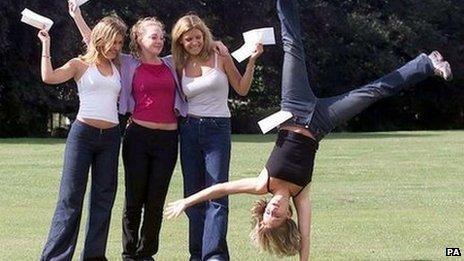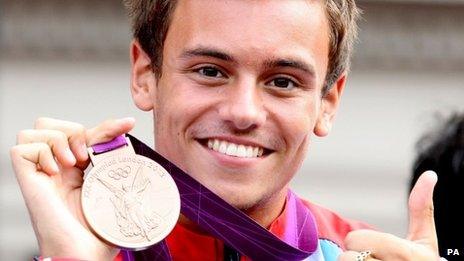Negative stereotypes 'hurting teenage job prospects'
- Published
- comments

Many teenagers think they are too rarely portrayed positively in the media
More than two thirds of 14-17-year-olds believe negative portrayals of teenagers in the media are affecting their job prospects, a survey suggests.
About 80% of teenagers questioned also believed they were more engaged with social issues than their predecessors.
The think tank, Demos, which commissioned the survey, said the findings "shatter misconceptions of disengaged teenagers".
More than 1,000 14-17-year-olds from England and Northern Ireland took part.
Demos said false stereotyping of young people in the media and wider society was having a negative effect on both their self-esteem and employment opportunities.
'Yobs' and 'crime'
It said four in five teens felt they were unfairly represented in the media and, of these a vast majority - 85% - said this was affecting their chances of getting a job.
Demos said its survey tested "attitudes and perceptions" of teenagers. It did not investigate the views of employers.
It said it had also analysed six UK newspapers over the past 10 years and found that the words most commonly associated with "teenagers", "youth" and "young people" were "binge-drinking", "yobs" and "crime".

Young Olympians are an example of young people portrayed positively, says the Society of Editors
Last month, McKinsey management consultants reached a different conclusion, blaming high levels of youth unemployment across Europe on a skills shortage rather than a lack of jobs or any reluctance to employ young people.
It said 27% of employers had left "entry-level" jobs unfilled because they could not find people with the necessary skills.
The European commissioner for education and youth, Androulla Vassiliou, said there was a mismatch between what education systems were delivering and what employers needed.
In a recent opinion piece, City & Guilds Group chief executive Chris Jones gave a similar assessment, external, saying most employers believed young people did not understand what businesses were looking for.
Asked if youth unemployment, external was down to structural change in the labour market and a skills shortage rather than negative portrayals in the media, the author of the Demos report, Jonathan Birdwell, said: "Those are absolutely valid points and important factors to consider.
"But there is this perception that they [teenagers] are negatively portrayed. Those messages have an impact on how they perceive their job opportunities.
"The fact that these perceptions are so widespread among young people has to have an impact."
Bob Satchwell, executive director of the Society of Editors, said young people "should remember that news media generally reports bad news because bad news is the unusual stuff".
He said if teenagers looked at media coverage more widely they would see "a much more balanced picture" with prominent positive reporting of high-achieving young people including A-level students, Olympic athletes and footballers, as well as young soldiers who had served the UK abroad.
No political engagement
The Demos survey also asked teenagers about social issues and found that 80% of those asked believed they were more concerned with social issues than previous generations of young people.
In a parallel survey for Demos by SchoolZone, two thirds of UK teachers agreed that teenagers today were more socially engaged than their own generations had been.
But the survey suggested social engagement did not translate into direct political engagement.
Only 10% of teens questioned saw politicians as agents of positive change, while 60% said they saw charities and social enterprises in that way.
"Teenagers are motivated to make a difference in their community but the approach they take is radically different to previous generations," said Mr Birdwell.
In the survey, 87% of teenagers said social media was an effective way to give momentum to social issues.
Mr Birdwell said: "They do not rely on politicians and others to solve the world's problems, but instead roll up their sleeves and power up their laptop and smartphone to get things done through crowd-sourced collaboration.
"They value bottom-up social action over top-down politics, and social enterprise over government bureaucracy.
"The next generation could be the most active citizens we have seen in a generation."